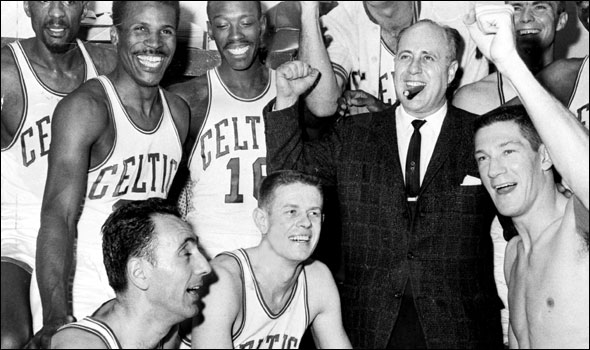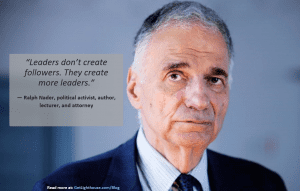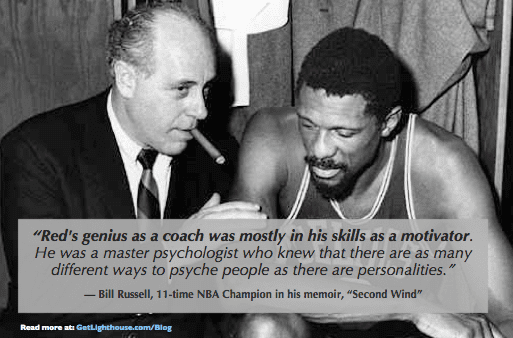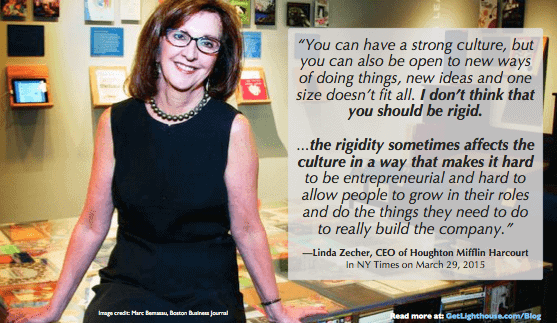Red Auerbach is one of the all time great coaches in professional sports history. As head coach of the Boston Celtics, his teams won 9 titles in an incredible 11 year span. He also played an essential role in breaking the color barrier in the NBA in the 1950s by drafting the first African American, and then later starting the first all African-American starting lineup.
Great leaders create more leaders.
Similar to the amazing coaching tree of another legend, NFL Hall of Fame head coach Bill Walsh, Red Auerbach developed future successful coaches as well. Former players Bill Russell, Tom Heinsohn, KC Jones, and Bill Sharman went on to win 7 titles as coaches as well.
Auerbach's emphasis on teamwork, and the fast break, were key to his success, as was his incredible eye for talent. A stunning 10 players from his teams became NBA Hall of Famers. A total of 16 titles were won while he served as head coach, general manager, or team president.
How did he do it? Today we look at how someone who drafted so many great players, and experienced so much success, managed to keep getting the best out of everyone and build a culture of winning.
Red Auerbach's Secret to Winning Teams
With a taste of success, it's easy to for egos to take over and people to start worrying about themselves more than others. Auerbach's focus on a team-first culture helped, but he didn't stop there.
The real key to Red Auerbach's success was that he knew that every player is motivated differently. As Hall of Fame player and coach, Bill Russell recalled in his book, Second Wind:
Everyone responds differently.
During the Celtics run, Bill Russell saw first hand how everyone was handled differently. Auerbach would yell at Tom Sanders and Don Nelson with incredible frequency. Meanwhile, as the best player on the team, Auerbach would often ask for permission to yell at Russell in future practices when he felt the team needed it. Russell would usually comply, but not always.
But he didn't always yell at everyone. Rather than taking a one-size-fits-all approach, he adapted to what would motivate each player. As Russell wrote in Second Wind:
"He knew he had to yell at Heinsohn shrewldy and personally, whereas he bullied Satch and Nelson...with KC Jones, you had to be honest and leave him alone; he'd do the rest.
I watched Red spend time with the Celtics who played the least...he always talked to them enough to remind them how important substitutes are to a team. He tended to be more supportive of them than of his regulars."
By adapting his coaching style to what each player responded to best, he got the most out of them. Russell continued this approach to great success after taking over the team from Auerbach.
How do you find out what motivates someone?
To lead like Red Auerbach, the first step is to figure out what your people respond to. Self-awareness is hard, so while asking them can help, not everyone knows, nor will outright tell you.
Instead, look for moments when you see them most motivated. Ask yourself:
- Do they aspire to certain achievements or promotions?
- Does the pressure of a deadline help or hurt?
- Do they enjoy being publicly recognized?
- Do they need to feel important?
- Are they self driven to the point being hands off is better?
As you observe your team members, double down on the tactics that each person responds to most. As important, take note when they react negatively to an approach you take.
A Story: An uncomfortable introvert
A friend of mine is very introverted. One day, their manager praised them in front of the whole team at a company outing.
For many of us, this would be a great, ego-stroking moment we would enjoy. However, my friend was mortified. I watched them look uncomfortable and squirm in their seat at the bar just recalling it.
Never assume something you would enjoy will motivate everyone on your team as well. Equally, some on your team may respond to forms of motivation that do not work on you.
Motivation is a moving target.
Unfortunately, once you find something that works, you can't just do the same thing over and over again. You need to keep your approaches fresh and mix things up. As Russell learned while playing for Red Auerbach:
"You couldn't say the same thing over and over to each; you had to dream up new ways of getting the message across.
Red used to brag that he could dream up a thousand different reasons for winning, but his real trick was that he could apply each one of those reasons to the right player at the right time."
Think about your own team. The first time you did something to motivate them, it was new and novel. If they responded well, you probably have done it again and again. However, if you keep doing it exactly the same way, it will start to lose its luster. Mixing it up again will help you return to the best results.
Motivation is a moving target. If you want to get the most from your team, you have to put in the effort to continue to innovate in how you motivate each person.
One-size-fits-all fails.
Whether you're looking at motivating your team, developing your culture, or how hands on (or off) you should be in their work, a one-size-fits-all approach will fail you.
As we learned today with Red Auerbach's approach to winning motivation, and previously Andy Grove's Task Relevant Maturity, the more you adapt to what's best for each person on your team, the better your team will perform.
Managers should adapt to their teams, not vice-versa.
How do you adapt your approaches to best lead each person on your team?








